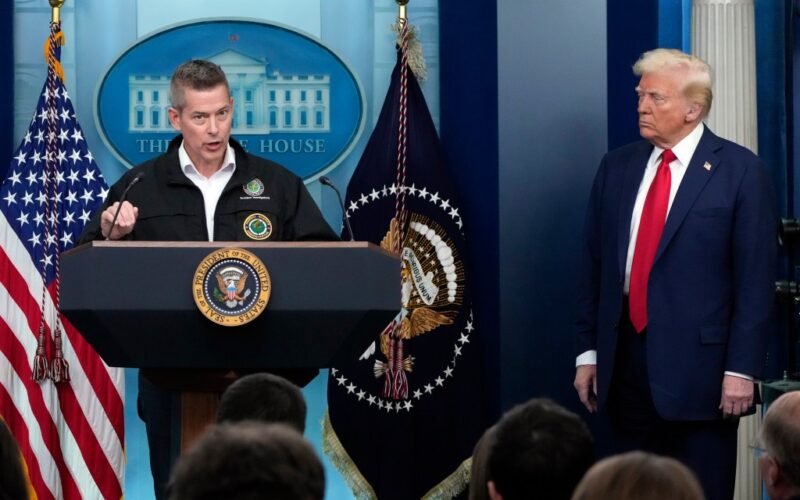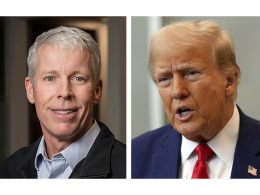To win transportation funding under the new Donald Trump administration, the MTA will have to cooperate with Immigrations and Customs Enforcement, can’t enforce mask or vaccine requirements — and had better hope New Yorkers start tying the knot and making babies.
The unusual guidelines for federal transportation funding are part of an order signed earlier this week by Transportation Secretary Sean Duffy — an ex-reality-TV star and two-term Wisconsin congressman — one day after his confirmation.
“To the extent practicable, relevant, appropriate and consistent with law,” the order reads, DOT is to adjudicate funding decisions to prioritize mitigating “family specific difficulties,” and “give preference to communities with marriage and birth rates higher than the national average.”
Agencies that get federal dollars for transportation projects are also now forbidden from instituting any for of mask or vaccine mandate.
The order also stipulates that recipients of federal DOT funding will be required to comply with federal immigration enforcement, as well as any “other goals and objectives specified by” Trump.
The order, signed Wednesday, is supposed to “strengthen American families by focusing on real, measurable benefits rather than ideological considerations,” according to a press release from the USDOT, which paired the order with another aimed at “Woke Rescission” — the elimination of all climate change, diversity and environmental justice initiatives at the department.
Asked about the order at an unrelated press gaggle Friday, MTA chairman Janno Lieber said he hadn’t seen it.
“Historically, DOT has established core, transportation-related criteria [for funding], and those have been successful,” he told reporters. “We hope and expect that those will continue to be basis for how money and grants are distributed.”
Asked if the MTA would cooperate with ICE agents as a requirement for funding, Lieber said his agency would follow the law.
“If there are folks who are sought for criminal activity, who are suspects or charged with criminal with criminal activity, we’re absolutely going to going to cooperate [with immigration agents,]” Lieber said. “Otherwise, we’re going to follow the lead of the state in how to handle any other situation.”
It remained unclear on Friday how Duffy’s order would be implemented, and how any of the prioritization of communities by marriage rates or birth rates could be construed as “practicable, relevant, appropriate and consistent with law.”
A spokesman for Sen. Chuck Schumer, the New York Democrat who served as Majority Leader until this month — and who has built a reputation for directing federal funding toward New York City transportation projects — said the Democratic leader was confident that the Empire State’s transit network would continue to be funded.
“Senator Schumer has a long track record of delivering for NY transit projects like Second Ave. Subway, Gateway, funding the MTA and so much more — no matter who is in the White House,” Angelo Roefaro, Schumer’s press secretary, told the Daily News. “He’ll continue to fight for New York transit and projects, and he’ll continue to deliver.”
Federal transportation grants are a key source of funding for many regional expansion projects.
The feds have committed $3.4 billion towards the $7.7 billion phase 2 of the Second Avenue Subway, and subsequent expansions of the line are expected to be similarly reliant on DOT funding. The Interborough Express light-rail project connecting Brooklyn to Queens — a $5.5 billion project — is expected to rely on some $3 billion in federal funds.

A new rail tunnel under the Hudson River — the crown jewel of the Gateway project meant to improve and expand rail access between New York and New Jersey — is reliant on $6.9 Billion in federal funds. The new tracks, bridges and infrastructure required to take advantage of the new tunnel — a laundry list of upgrades to the lines crossing the northern New Jersey swamplands — is expected to need significant federal investments as well.
And it’s not just trains. The city’s DOT is seeking federal DOT grants toward its efforts to repair and re-design of the BQE’s triple cantilever roadway in Downtown Brooklyn.

Theodore Parisienne for New York Daily News
Views of the Brooklyn Queens Expressway and Brooklyn Heights Promenade. (Theodore Parisienne for New York Daily News)
In the past year, smaller federal grants have gone towards projects like the Penn Station re-design and aging city bridges.








